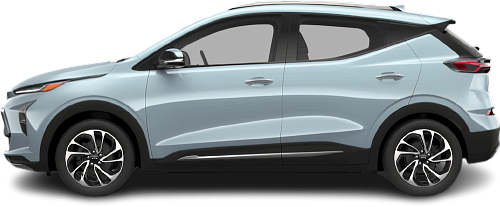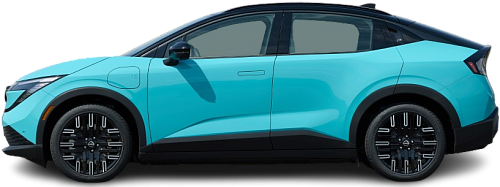USA EV Comparison: Chevrolet Bolt EUV Gen 1 vs Nissan Leaf 75 kWh
Struggling to Decide? Let AI Help!
Your AI Summary Is Ready!
General Info
The Nissan Leaf 75 kWh (2025-…) is announced, but not yet in production. The Chevrolet Bolt EUV Gen 1 (2022-2023) has been discontinued. You can find it for as low as $11433 on the used car market.
The two vehicles share the same body style: SUV.
| Property | Chevrolet Bolt EUV Gen 1 | Nissan Leaf 75 kWh |
|---|---|---|
| Years of Production | 2022-2023 | 2025-… |
| Current Status | Discontinued | Announced |
| Country of Manufacture | USA | Japan, UK, USA |
| Body Style | SUV | SUV |
| Market Availability | USA | EU, USA |
| Price USA (New) | - Price USA (New) | $37000 |
| Price USA (Used) | $11433 | - Price USA (Used) |
| GCC Score | 5.8 | 5.9 |
Range and Efficiency
The Nissan Leaf 75 kWh (2025-…) boasts a greater real-world range, a larger battery, and superior energy efficiency compared to the Chevrolet Bolt EUV Gen 1 (2022-2023).
| Property | Chevrolet Bolt EUV Gen 1 | Nissan Leaf 75 kWh |
|---|---|---|
| Range (EPA) | 247 mi | 303 mi |
| Range (GCC) | 235 mi | 288 mi |
| Battery Capacity (Nominal) | 65 kWh | 75 kWh |
| Battery Capacity (Usable) | 61.8 kWh | 71.2 kWh |
| Efficiency per 100 mi | 26.3 kWh/100 mi | 24.7 kWh/100 mi |
| Efficiency per kWh | 3.8 mi/kWh | 4.04 mi/kWh |
| Range and Efficiency Score | 7 | 8.4 |
Charging
Both vehicles utilize a standard 400-volt architecture.
The Nissan Leaf 75 kWh (2025-…) offers faster charging speeds at DC stations, reaching up to 150 kW, while the Chevrolet Bolt EUV Gen 1 (2022-2023) maxes out at 55 kW.
The Chevrolet Bolt EUV Gen 1 (2022-2023) features a more powerful on-board charger, supporting a maximum AC charging power of 11.5 kW, whereas the Nissan Leaf 75 kWh (2025-…) is limited to 7.2 kW.
| Property | Chevrolet Bolt EUV Gen 1 | Nissan Leaf 75 kWh |
|---|---|---|
| Max Charging Power (AC) | 11.5 kW | 7.2 kW |
| Max Charging Power (DC) | 55 kW | 150 kW |
| Architecture | 400 V | 400 V |
| Charge Port | CCS Type 1 | Tesla (NACS) |
| Charging Score | 6 | 5.1 |
Performance
Both vehicles are front-wheel drive.
The Nissan Leaf 75 kWh (2025-…) boasts greater motor power and accelerates faster from 0 to 60 mph.
| Property | Chevrolet Bolt EUV Gen 1 | Nissan Leaf 75 kWh |
|---|---|---|
| Drive Type | FWD | FWD |
| Motor Type | PMSM | PMSM |
| Motor Power (kW) | 150 kW | 160 kW |
| Motor Power (hp) | 201 hp | 214 hp |
| Motor Torque | 266 lb-ft | 261 lb-ft |
| 0-60 mph | 7 s | 6.8 s |
| Top Speed | 91 mph | 106 mph |
| Performance Score | 3.5 | 3.7 |
Dimensions
The Nissan Leaf 75 kWh (2025-…) is longer and wider, but the Chevrolet Bolt EUV Gen 1 (2022-2023) is taller.
Both models have similar wheelbase lengths.
| Property | Chevrolet Bolt EUV Gen 1 | Nissan Leaf 75 kWh |
|---|---|---|
| Length | 169.5 in | 173.4 in |
| Width (with Mirrors) | - Width (with Mirrors) | 82.6 in |
| Width (w/o Mirrors) | 69.7 in | 71.3 in |
| Height | 63.6 in | 61.3 in |
| Wheelbase | 105.3 in | 105.9 in |
Cargo and Towing
The Nissan Leaf 75 kWh (2025-…) features a larger trunk, but the Chevrolet Bolt EUV Gen 1 (2022-2023) offers greater maximum cargo capacity when the rear seats are folded.
Neither car is equipped with a frunk (front trunk).
Neither vehicle is officially rated for towing in the US.
| Property | Chevrolet Bolt EUV Gen 1 | Nissan Leaf 75 kWh |
|---|---|---|
| Number of Seats | 5 | 5 |
| Curb Weight | 3680 lb | 4187 lb |
| Cargo Volume (Trunk) | 16.3 ft3 | 20 ft3 |
| Cargo Volume (Max) | 56.9 ft3 | 55.5 ft3 |
| Cargo Volume (Frunk) | - Cargo Volume (Frunk) | - Cargo Volume (Frunk) |
| Cargo and Towing Score | 6 | 5.8 |




